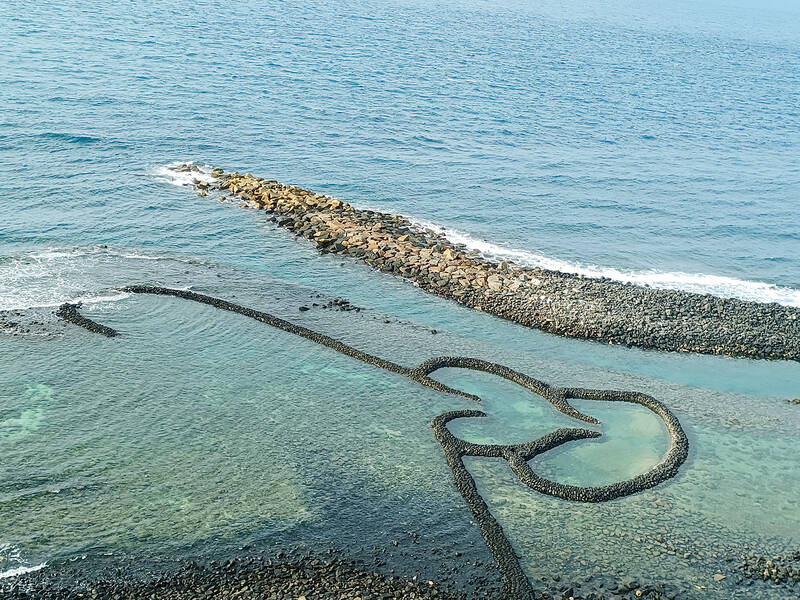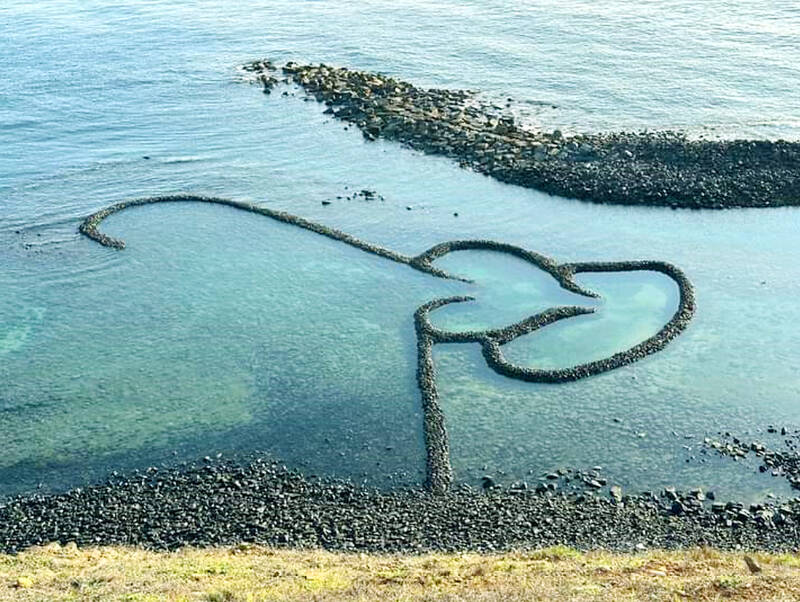A landmark in Penghu County’s Cimei Township (七美) that was damaged by strong winds and waves from a monsoon storm earlier this year has been restored, after the Penghu County Cultural Affairs Bureau enlisted help from 10 repair specialists.
The Twin Hearts Stone Weir (雙心石滬) was built out of basalt stones and coral reefs as a traditional trap for catching fish, and although the catches gradually decreased, the romantic twin heart shape of the weir attracted many tourists each year, and it has been voted the most beautiful scenic spot in Penghu many times.
As there was strong wind and waves at the end of last year, with a Beaufort wind force 12 storm recorded during the Lunar New Year holidays, part of the weir was destroyed, county officials said.

Photo: Liu Yu-ching, Taipei Times
The Penghu County Cultural Affairs Bureau on Friday invited 10 stone weir repair specialists, led by 73-year-old Hsieh Ming-shou (謝銘受) from Penghu’s Jibei Island (吉貝) to repair the stone weir.
The first three days of the repair process was the most difficult, as the foundation of the stone weir needed large stones that were carefully chosen — usually long, triangular and heavy, officials said.
After the large stones were carried to site, the repair specialists needed to use force to place them at special angles, they said.

Photo courtesy of Penghu County Cultural Affairs Bureau
As stone weir repair is a traditional skill, most of the specialists are older, so carrying the stones can be difficult for them, but the team had a new member this year — the 45-year-old son of stone weir repair specialist Chen Chang-shou (陳長壽).
The team led by Hsieh repaired the Twin Hearts Stone Weir after eight days, Penghu County Tourism Bureau head Hung Dong-lin (洪棟霖) said on Saturday.
Hung thanked them for “preserving the precious cultural heritage and allowing the ancestors’ wisdom to live on through the stone weirs.”

WANG RELEASED: A police investigation showed that an organized crime group allegedly taught their clients how to pretend to be sick during medical exams Actor Darren Wang (王大陸) and 11 others were released on bail yesterday, after being questioned for allegedly dodging compulsory military service or forging documents to help others avoid serving. Wang, 33, was catapulted into stardom for his role in the coming-of-age film Our Times (我的少女時代). Lately, he has been focusing on developing his entertainment career in China. The New Taipei District Prosecutors’ Office last month began investigating an organized crime group that is allegedly helping men dodge compulsory military service using falsified documents. Police in New Taipei City Yonghe Precinct at the end of last month arrested the main suspect,

A cat named Mikan (蜜柑) has brought in revenue of more than NT$10 million (US$305,390) for the Kaohsiung MRT last year. Mikan, born on April 4, 2020, was a stray cat before being adopted by personnel of Kaohsiung MRT’s Ciaotou Sugar Refinery Station. Mikan was named after a Japanese term for mandarin orange due to his color and because he looks like an orange when curled up. He was named “station master” of Ciaotou Sugar Refinery Station in September 2020, and has since become famous. With Kaohsiung MRT’s branding, along with the release of a set of cultural and creative products, station master Mikan

Eleven people, including actor Darren Wang (王大陸), were taken into custody today for questioning regarding the evasion of compulsory military service and document forgery, the New Taipei District Prosecutors’ Office said. Eight of the people, including Wang, are suspected of evading military service, while three are suspected of forging medical documents to assist them, the report said. They are all being questioned by police and would later be transferred to the prosecutors’ office for further investigation. Three men surnamed Lee (李), Chang (張) and Lin (林) are suspected of improperly assisting conscripts in changing their military classification from “stand-by

LITTORAL REGIMENTS: The US Marine Corps is transitioning to an ‘island hopping’ strategy to counterattack Beijing’s area denial strategy The US Marine Corps (USMC) has introduced new anti-drone systems to bolster air defense in the Pacific island chain amid growing Chinese military influence in the region, The Telegraph reported on Sunday. The new Marine Air Defense Integrated System (MADIS) Mk 1 is being developed to counter “the growing menace of unmanned aerial systems,” it cited the Marine Corps as saying. China has constructed a powerful defense mechanism in the Pacific Ocean west of the first island chain by deploying weapons such as rockets, submarines and anti-ship missiles — which is part of its anti-access/area denial (A2/AD) strategy against adversaries — the